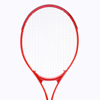Articles
As London is heading for the 2012 Olympics, it's not just athletes who are gearing up for action. Engineers, too, are working hard to produce the cutting-edge sporting equipment that guarantees record performances. If you're a tennis player, your most important piece of equipment is your racket. Over recent decades new materials have made tennis rackets ever bigger, lighter and more powerful. So what kind of science goes into designing new rackets?
England's performance in the World Cup last summer was thankfully overshadowed by the attention given to Paul the octopus, who was reported as making an unbroken series of correct predictions of match winners. David Spiegelhalter looks at Paul's performance in an attempt to answer the question that (briefly) gripped the world: was Paul psychic?
It is thought that the next great advances in biology and medicine will be discovered with mathematics. As biology stands on the brink of becoming a theoretical science, Thomas Fink asks if there is more to this collaboration than maths acting as biology's newest microscope. Will theoretical biology lead to new and exciting maths, just as theoretical physics did in the last two centuries? And is there a mathematically elegant story behind life?
This article is part of a series of two articles exploring two ways in which mathematics comes into food, and especially into food safety and health. In this article we will take a dive into the rather smelly business of digesting food, and how a crazy application of chaos theory shows the best way to digest a medicinal drug.
This article is part of a two-part series exploring ways in which mathematics comes into food, and especially into food safety and health. In this part we'll look at how maths can tell us the safest way to cook food.
In many sports a particular tactical conundrum arises. The team captain has to choose the best order in which to use a group of players or set-plays in the face of unknown counter choices by the opposition. Do you want to field the strongest players first to raise morale or play them last to produce a late run for victory? John D. Barrow shows that randomness holds the answer.
The work of Fields Medallist Stanislav Smirnov will take mathematics and physics into a new phase with his mathematical proof of the understanding of phase transitions.
